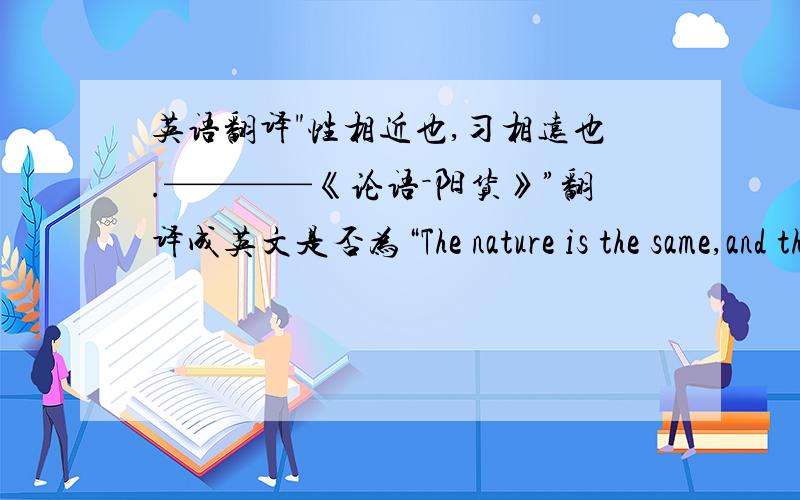英语翻译"性相近也,习相远也.————《论语-阳货》”翻译成英文是否为“The nature is the same,and the habit is the differences.”其中《论语-阳货》中《论语》翻译成——The analects.其中《论语-
来源:学生作业帮助网 编辑:作业帮 时间:2024/07/29 06:52:52

英语翻译"性相近也,习相远也.————《论语-阳货》”翻译成英文是否为“The nature is the same,and the habit is the differences.”其中《论语-阳货》中《论语》翻译成——The analects.其中《论语-
英语翻译
"性相近也,习相远也.————《论语-阳货》”
翻译成英文是否为
“The nature is the same,and the habit is the differences.
”
其中《论语-阳货》中《论语》翻译成——The analects.
其中《论语-阳货》中《阳货》翻译成——In relief goods.
而“染于苍则苍,染于黄则黄.——《墨子—所染》”
翻译成英文又是什么?
英语翻译"性相近也,习相远也.————《论语-阳货》”翻译成英文是否为“The nature is the same,and the habit is the differences.”其中《论语-阳货》中《论语》翻译成——The analects.其中《论语-
性相近也,习相远也:人的原始天性是相似的,只是在后天不同的环境中受到不同的影响后才会产生区别,最终形成千差万别的个性.
试着翻译一下:
man's nature is born in resemblance,while diversifies distinctly thereafter
染于苍则苍,染于黄则黄:直接翻译出来是:人的性格形成就像是白色的丝线,被青色所染就变为青色,被黄色所染就变为黄色.
意思就是说,性格的形成受环境的影响.
one's character is submissive to his surroundings
《论语》:The Analects of Confucius
《论语-阳货》:人名,论语一般用每章的前几个字命名
阳货欲见孔子,孔子不见.归孔子豚.孔子时其亡也,而往拜之,...
我觉得应该译为 the chapter of Yanghuo
前几个翻译应该都对。最后的“染于苍则苍,染于黄则黄”应译为“Put what colour on it,what colour it shows”。
" Their natures are much the same, Xi Xiangyuan." the Analects of Confucius - Yang goods""
" Stained with gray, pale, stained with yellow yellow. " Mo-tse" -- with"
By nature, men are nearly alike; by practice, they get to be wide apart.